If your Windows laptop is making high-pitched noises from speakers, then this post will help you fix this issue. This issue is frustrating because you cannot focus on your work. Usually, this issue can occur due to outdated audio drivers or the audio enhancement feature.

Laptop making high pitched noise from speakers
Use these fixes if your Windows laptop is making high-pitched noise from speakers:
- Hard reset your laptop
- Run System Diagnostics
- Restart the Windows Audio service
- Update or reinstall your Speaker driver
- Disable Audio Enhancement
- Disable the internal microphone
- Update the BIOS
- Electromagnetic interference
- Your speakers may be faulty
Let’s start.
1] Hard reset your laptop
The first step you should take is to hard reset your laptop. Use the following steps to hard reset your laptop:
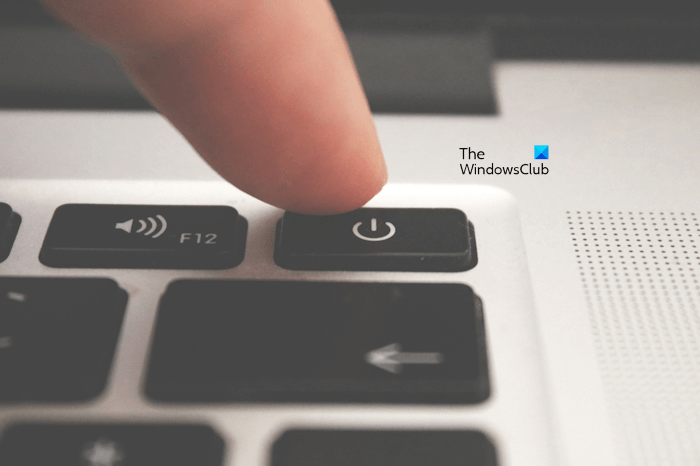
- Turn off your laptop.
- Disconnect all peripheral devices connected to your computer.
- Disconnect the charger and remove the battery. If your laptop has a non-removable battery, skip removing the battery.
- Press and hold the power button for up to 30 to 45 seconds.
- Turn on your laptop.
Now, check whether your laptop is making a high-pitched noise from speakers.
2] Run System Diagnostics
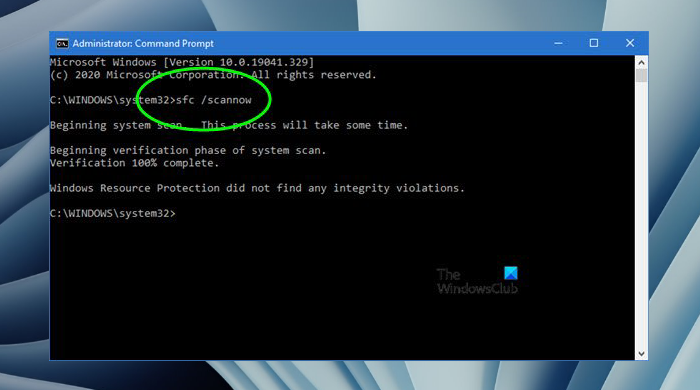
You can also run a system diagnostics. Windows 11/10 has a built-in tool, called System Information. You can use this tool to generate the health report of your system.
Some computer manufacturers provide this feature in the dedicated software developed by them. For example, if you have an ASUS computer, the MyASUS app allows you to run the complete system check under the System Diagnosis section.
3] Restart the Windows Audio service
The Windows Audio service running in Windows 11/10 helps to manage audio for programs. If this service is stopped or disabled on your system, it will affect the sound devices. In this case, you need to start/restart the Windows Audio service.
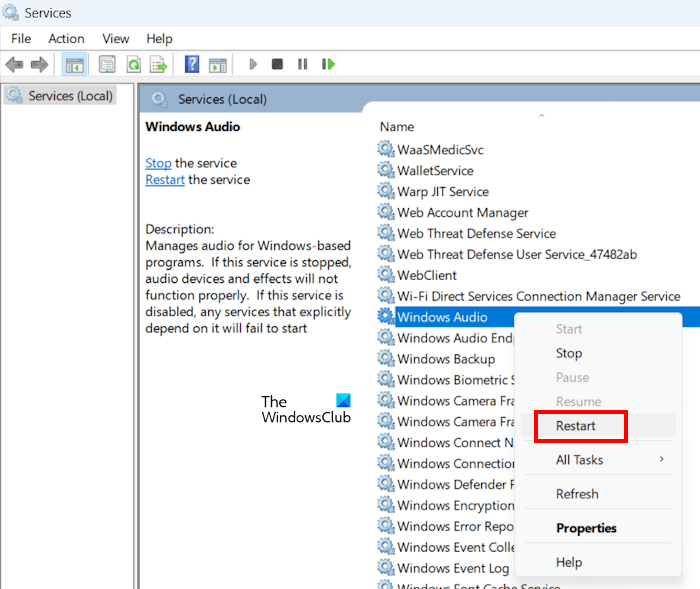
- Press the Windows key + R to open the Run dialog.
- Type “Services.msc” and click OK.
- In the Services window, scroll and locate the Windows Audio service.
- Double-click on the Windows Audio service and select Properties.
- In the Properties window, click the drop-down on the Startup type and select Automatic.
- Next, make sure the service is running. If the service is already running, right-click the entry and select Restart from the context menu.
- Click Apply > OK to save changes.
- Restart your PC.
4] Update or reinstall your Speaker driver
An outdated or corrupted speaker driver can cause the issue. Make sure your speaker driver is up to date. You can update your speaker driver from the manufacturer’s website.
Alternatively, you can reinstall the driver. To do so use the below steps:
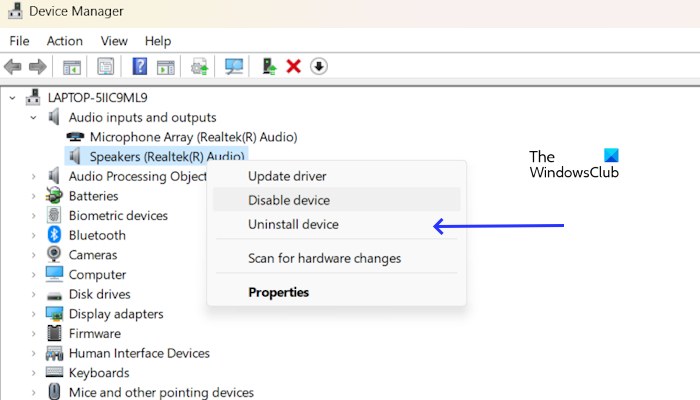
- Go to the Device Manager.
- Expand Audio inputs and outputs.
- Right-click on your speaker driver.
- Now, click on Uninstall device.
Restart your computer to reinstall your audio device driver.
5] Disable Audio Enhancement
We also suggest you disable the audio enhancement. Sometimes, this feature can cause issues with some audio devices. To confirm whether this is the case with you, disable this feature. Use the below instructions to disable this feature:
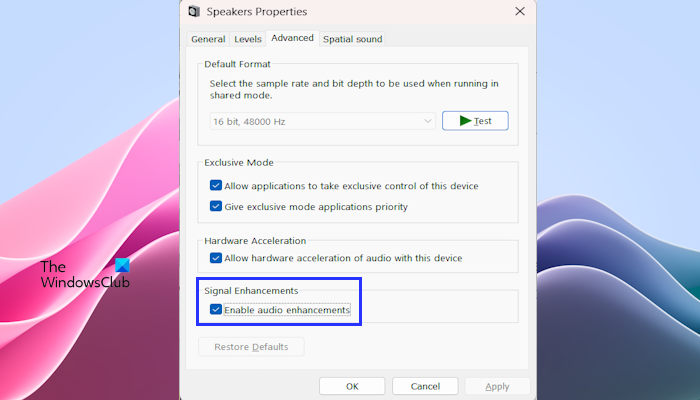
- Open the Control Panel.
- Type sound in the Control Panel search bar and click Sound.
- The Sound properties window will appear—Double-click on your Speakers to open its Properties.
- Click on the Advanced tab and uncheck the Enable audio enhancement box.
- Click Apply and then click OK.
Check if the issue persists.
6] Disable the internal microphone
There is a possibility that an internal microphone can cause high-pitched noise from speakers. Disable the internal microphone to fix this issue if this is the case.
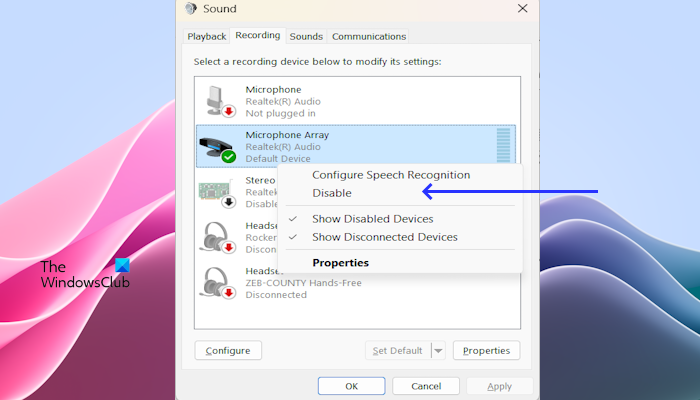
- Open the Control Panel.
- Click Sound and tap on the Recording tab.
- Right-click on your internal microphone.
- Click on Disable.
- Click Apply and then click OK.
Now, check if it brings any changes.
7] Update the BIOS
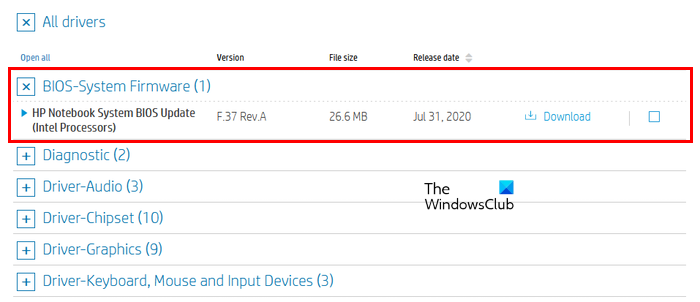
If none of the solutions work for you, then update your BIOS (if available). Before updating the BIOS, you need to check the version of BIOS from the System Information or Command Prompt. If an update is available, install it. You can download the latest BIOS update from the official website of your computer manufacturer.
8] Electromagnetic interference
Speakers or other audio devices can also cause unwanted noise due to electromagnetic interference. This unwanted noise can be a buzzing noise, high-pitched noise, etc. This phenomenon occurs due to the electromagnetic field. There are many sources of electromagnetic fields, such as current-carrying power cables, electronic devices, etc. To check and fix this issue, move your laptop to another place.
9] Your speakers may be faulty

If none of the solutions work for you, then there is a possibility that your speakers are faulty. we suggest you take your computer to the service center or a professional computer repair technician
Why are my PC speakers making a high pitched noise?
There can be several reasons why your PC speakers are making a high-pitched noise. The most common reasons are electromagnetic interference and high microphone or speaker volume. Sometimes, high speaker volume causes the sound to distort due to which speakers produce a humming or buzzing sound. We also suggest you keep your speaker drivers up to date.
How do I know if my speakers are damaged?
If your speakers are damaged, they will create scratchy, crackling, or buzzing sounds. There are some ways to identify whether your speakers are damaged or not, such as uneven sound, distortion, lack of bass, no sound, etc.
Read next: How to disable or enable Loudness Equalization in Windows.